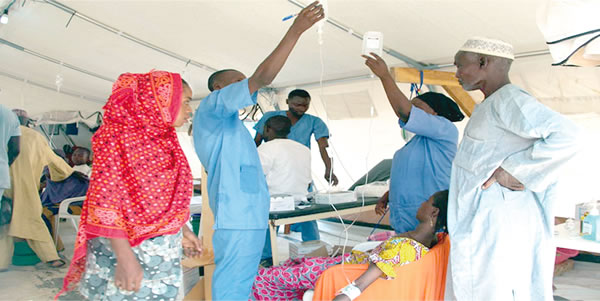
Following the outbreak of cholera across many states of the country, SADE OGUNTOLA, in this report, spoke to experts on the measures to be taken by Nigerians on how to prevent the spread of the killer disease at a time the choice of what is ingested by many is limited because of the prevalent hardships in the country that has increasingly affected the purchasing power of many Nigerians.
IN recent weeks, Nigeria has faced a significant public health challenge with the outbreak of cholera, a highly contagious and potentially fatal bacterial infection, that has placed immense strain on already fragile healthcare systems.

The rapid increase in cases reported in states has underscored systemic issues ranging from inadequate sanitation infrastructure to limited access to clean water, that continue to exacerbate the spread of the disease among vulnerable communities.
According to the World Health Organisation (WHO), at least 194,897 deaths and 1,932 cases have been recorded globally between January 1, 2024 and May 26, 2024. This is just as the Nigeria Centre for Disease Control and Prevention (NCDC), in a recent report, said over 1,141 suspected and over 65 confirmed cases of cholera, resulting in over 30 deaths, had been reported from 96 LGAs in 30 states between January 1 and June 11, 2024.
Media reports in the last couple of weeks indicated that Lagos has become a notorious hot-spot for the spread of the deadly disease with many fatalities attributed to severe dehydration caused by delayed presentation of the cholera cases. The government also revealed that the primary cause of the recent cholera outbreak in the state was linked to an unregistered tiger nut drink in circulation in some parts of the state.
Giving an update last Friday, the Lagos State government indicated that a total of 24 persons have lost their lives to the disease as of June 19, 2024.
The report also said while a total of 417 suspected cases have been recorded in the state, only 35 cases have been confirmed so far across the 20 local government council areas.
Similarly, the Ogun State Commissioner for Health, Tomi Coker, confirmed the outbreak of the disease which has claimed the life of a 62-year-old woman and left five persons hospitalised.
To arrest the outbreak, in light of recent developments, the NCDC Director General, Dr Jide Idris, said the centre was monitoring the situation and might declare an emergency if data showed that the outbreak had gone beyond a manageable threshold.
As the number of confirmed cases continues to rise, urgent interventions are crucial to stem the spread of this highly infectious disease and mitigate its devastating impact on communities nationwide.

In a reaction to the current cholera cases across the country, Professor of Environmental Health Sciences at the Faculty of Public Health of the College of Medicine, University of Ibadan, Elizabeth Oloruntoba, stated that the reported cases are indications that people need to wake up and take their lives into their own hands.
She stated that consuming water or food contaminated with the excreta of people infected with Cholera vibrio is the primary cause of cholera outbreaks.
She claims that cholera and other water-borne/water-washed diseases are transmitted through the faecal-oral routes that may occasionally involve contamination of water, food, and fingers/hands. Also, carriers such as flies can deposit disease-causing germs when they perch on foods, such as fruits, that people eat without realising they carry the cholera germ.
However, she said that cholera, like other diarrheal or waterborne diseases, is dangerous for all age groups, even though it is preventable by many measures, including personal hygiene, water hygiene, food hygiene and safety, and general environmental cleanliness.
“We don’t know what happened or how the index case got cholera. But it was rumoured that he ate Tigernut. And the question is, what happened? Is it the water they sprinkled on it or that he forgot to wash it before consumption? We don’t know the whole story.
“In the end, though, food or water contamination is what causes these kinds of outbreaks. The diseases are transmitted through the faecal-oral route, which allows pathogens in the excreta of an infected person to get to a new host through various routes such as water/fluid, contamination, fingers soiled with excreta, use of raw faeces as manure in the farm, and flies perching on uncovered food.”
While experts continue to advocate for potable water supply, Professor Oloruntoba stated that even the mode of handling the water from source, through collection, to handling in the household, can cause the quality to deteriorate.
She said Nigerians should consider simple water purification methods such as boiling, use of alum, filtration, and disinfection in their homes and make sure that water is stored safely in containers with small openings and taps, especially in situations where the government is not providing people with enough potable water.

“There are cheap and affordable methods that we can also use at the household level,” she added.
According to her, “We are more worried about the microbial quality of the water, which alum may not be able to solve. Alum as a coagulant will help bring together suspended particles in your water so that they can settle easily under gravity.
“However, you just need an effective dose of microorganisms to cause diarrheal disease, what is medically referred to as gastroenteritis. And within six hours you are already feeling the pinch.”
Professor Oloruntoba declared that, importantly, people need to wake up and take their lives into their own hands by checking the quality of the water they drink at the household level.
“UNICEF once introduced the Bacto Hydrogen Sulphide Strip to check water quality. It provides a quick indication of the quality of water. It is comparable to the pregnancy test kit or the quick malaria diagnosis kit. The intensity of the colour change in the bottle with the strip and water provides information on how polluted the water is,” she added.
The don advised Nigerians not to drink water from sachets because they can be readily contaminated by the hands of the people who pack and sell them.
“You’d be amazed that somebody who just picks up a sachet of water to drink immediately without cleaning it might be consuming something else apart from the water.
“Therefore, individuals need to practice better hygiene and be aware of where they can obtain clean water to drink. Purchasing sachet water off the side of the road is certainly a no.”
Additionally, rainwater provides good access to fresh water supply during the rainy season. However, the mode of collection and storage may lead to contamination with disease-causing organisms. Professor Oloruntoba brought up the prospect that contaminated rainfall can also cause diarrhoea, including cholera.
She claimed that disease-causing germs that cause water-borne diseases such as diarrhoea, cholera, typhoid, and polio are normal flora of the intestines of man and other warm-blooded animals. They cause infections through the faecal-oral transmission routes.
“Lack of proper hygiene, not washing your hands at critical times, can also help to transmit pathogens from an infected person to other people,” she added, lamenting Nigeria’s low standard of hygiene. When we have issues like these, it all comes down to ensuring personal hygiene (especially hand washing with soap and water), food hygiene, water hygiene, and overall environmental cleanliness.
Speaking in the same vein, a public health expert and former President and National Chairman of the Association of Public Health Physicians of Nigeria, Professor Tanimola Akande, declared that the cholera cases were reported in areas in Lagos State, including Lagos Island, which has several slums and shanty towns.
According to him, “It also has bustling markets that are overcrowded and with poor sanitation. This may be responsible for the outbreak of cholera.
“The level of access to potable water and good sanitation is relatively low in Nigeria. Open defecation is still being practised by people either around slums, shanty towns, or some commercial areas. The practice of regular hand washing with soap is also very low. Food hygiene is not optimal, particularly among food vendors.”
In his contribution, a professor of medical anthropology, sociology, and bioethics at the University of Ibadan, Ayodele Jegede, said that man is an important agent that influences the environment through action and inaction.
According to him, cholera being a hygiene-related disease is about the quality of the interaction of man with the environment.
“It is about adaptation and survival struggle between man and the bacteria causing the disease. When a man is careless with his adaptive mechanism, bacteria will fill the gap. So, cholera is a highly preventive disease if men pay attention to hygiene.
“Hygiene is part of food security. When what people eat or drink is contaminated, it means the food is insecure. Now people eat or drink what they see and not what they want. The choice is limited now that people just eat to survive. The danger in this is that some people may not pay attention to other things that may endanger life in the face of hunger.”
- Additional reporting by Ifedayo Ogunyemi
ALSO READ: Cholera: Stop drinking rainwater, Kano govt warns residents







